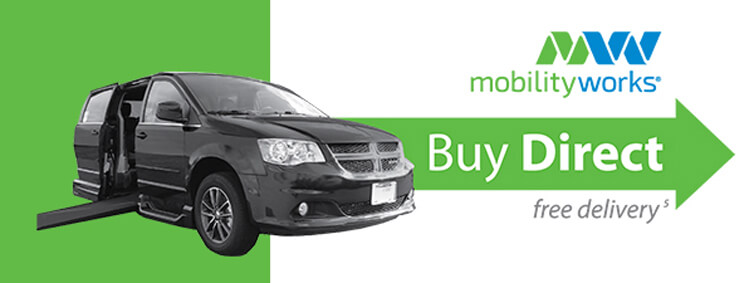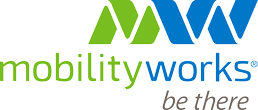
Melissa is a smart young woman who recently graduated from the STRIVE program where she learned life skills and how to be independent. The 22-year-old from Crystal Lake, Illinois, loves listening to music and helping others. She enjoys swimming and spending time with her family. But unlike other 22-year-olds, Melissa has overcome huge setbacks. Melissa is hoping to raise funds for a wheelchair accessible vehicle with help from our MobilityWorks store in Villa Park, Illinois.
Melissa Gets a Diagnosis
“There are many things that I would like to do and be part of but my ability to get around has been limited due to my ailments which include Type 2 Diabetes, Autism, Brittle Bones [Osteopenia] and Dystonia,” Melissa said.
“Dystonia was mentioned as a potential diagnosis in 2012, but I wasn’t officially diagnosed with it until December 2013,” Melissa said. “I kept falling a lot and would injure my wrist or ankle, or sometimes both. They would bruise and swell up and it was very painful so the orthopedic doctor I saw would usually put a cast on to make me feel better. Sometimes the x-rays would show there was actually a broken bone. I started to see a neurologist who ordered some tests and I was diagnosed with a form of dystonia. Dystonia is a progressive neuromuscular disorder that can resemble Multiple Sclerosis, ALS and cerebral palsy. There is really no cure but doctors treat the symptoms as they come up.”
Because Melissa has mobility challenges and she falls often, she uses a power wheelchair most of the time. She also sometimes uses her manual wheelchair and walker, but her muscles can be spastic. In addition to her muscular challenges, she has to be careful with what she eats due to her Diabetes. Between medication, blood sugar checks and other difficulties Melissa can become stressed out easily. She does her best to focus on the positives from her Northern Illinois Special Recreation Association[NISRA] Special Olympics team to being with her 19-year-old sister Rebecca and 18-year-old brother Adam.
The Family Faces Challenges
 “My family’s lives have been turned upside down since my diagnosis,” Melissa said. “I went from running on the track team to being in a wheelchair in 2 years.”
“My family’s lives have been turned upside down since my diagnosis,” Melissa said. “I went from running on the track team to being in a wheelchair in 2 years.”
Melissa’s mom, despite suffering from a brain aneurysm, has spent lots of time taking her to doctor appointments and researching care. Melissa’s mom had to retire from being a nurse and has a damaged back from years of lifting, so getting Melissa into a traditional vehicle is difficult.
“My siblings have suffered as they have cancelled plans to stay home to help me because my mom was sick in the hospital and my dad was working,” Melissa said. “My dad worked hard for years to provide good health insurance for the family. My dad recently lost his job and our health insurance. We cannot get unemployment benefits so right now we have social security and my mom’s disability. Medical equipment, prescriptions and care is very expensive. Everyone in my family has sacrificed a lot to keep me going. We are a close knit family and we stick together.”
Melissa’s family is currently renting their home so they cannot make structural changes. Each night, Melissa is forced to crawl up the stairs to get to her bedroom which is tiring. Luckily, some kind neighbors built a wheelchair ramp outside their front door last year.
Melissa Spreads Awareness
“Another challenge is getting people to understand and accept others with differences that can be seen and unseen,” Melissa said.
Melissa uses this message with Team Melissa, an effort for inclusiveness for all.
“Team Melissa was a fundraising effort that we did with the help of 3ELove, a company founded by a young lady in a wheelchair who wanted to promote acceptance of people with disabilities,” Melissa said. “She passed away unexpectedly so her brother took over the company. Each January, we celebrate the International Day of Acceptance of people with disabilities.”
Melissa enjoys working with 3ELove and many other great nonprofits including Autism Speaks and NISRA. Her biggest goal is to improve how families access support.
“Everything we have learned is by word of mouth from others or what my mom has researched,” Melissa said. “We don’t have the financial means for a vehicle and some people lack medical care. We seem to have fallen through the cracks of society where we don’t qualify for many programs. I would like to promote widespread acceptance of disabilities and differences.”
Hoping for Accessibility
 “My power chair currently stays home when I go out because my parents’ cars do not have lifts,” Melissa said. “Since my dad lost his job, we cannot even consider a used wheelchair van. My manual wheelchair is heavy and my mom is not supposed to lift it as there is a risk of her having a seizure and injuring herself further. The public transportation is unreliable and only available at certain times. They are closed on weekends as well. If I had a wheelchair van, I could get to doctor appointments easier and volunteer at several places.”
“My power chair currently stays home when I go out because my parents’ cars do not have lifts,” Melissa said. “Since my dad lost his job, we cannot even consider a used wheelchair van. My manual wheelchair is heavy and my mom is not supposed to lift it as there is a risk of her having a seizure and injuring herself further. The public transportation is unreliable and only available at certain times. They are closed on weekends as well. If I had a wheelchair van, I could get to doctor appointments easier and volunteer at several places.”
“You can pay it forward, volunteer with the disabled or make a meal for someone down on their luck,” Melissa said. “There are so many things that can be done and if everyone volunteered a little bit the world would be a better place and people would feel better about themselves.”



